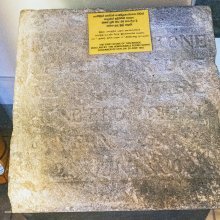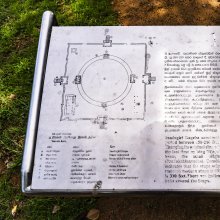Mul, Mūl, Mūḻ, Mūḷ: 9 definitions
Introduction:
Mul means something in Hinduism, Sanskrit, Tamil. If you want to know the exact meaning, history, etymology or English translation of this term then check out the descriptions on this page. Add your comment or reference to a book if you want to contribute to this summary article.
The Sanskrit term Mūḷ can be transliterated into English as Mul or Muli, using the IAST transliteration scheme (?).
Images (photo gallery)
(+7 more images available)
Languages of India and abroad
Sanskrit dictionary
Source: DDSA: The practical Sanskrit-English dictionaryMul (मुल्).—1 U. (molayati-te) To plant.
--- OR ---
Mūl (मूल्).—I. 1 U. (mūlati-te) To take or strike root, be firm, stand fast. -II. 1 U. (mūlayati-te, mūlita)
1) To plant, cause to grow, rear.
2) To grow, sprout, germinate.
Source: Cologne Digital Sanskrit Dictionaries: Shabda-Sagara Sanskrit-English DictionaryMul (मुल्).—r. 10th cl. (molayati-te) To plant: more usually mūla .
--- OR ---
Mūl (मूल्).—r. 1st cl. (mūlati-te) 1. To stand, to be rooted or firm. 2. To accumulate. r. 10th cl. (mūlayati-te) 1. To plant or transplant. 2. To grow as a plant, to sprout, to shoot or germinate. With ud prefixed, to root up or out, to eradicate, to exterminate.
Source: Cologne Digital Sanskrit Dictionaries: Benfey Sanskrit-English DictionaryMul (मुल्).—see 2. mūl.
--- OR ---
Mūl (मूल्).— (cf. mūla), i. 1, [Parasmaipada.] (and [Ātmanepada.]), To stand, to be rooted, or firm.
--- OR ---
Mūl (मूल्).—also † mul Mul. i. 10 (rather a [denominative.] derived from mūla), To plant.
— With the prep. ud ud, 1. To uproot, [Hitopadeśa] ii. [distich] 84. 2. To destroy, [Vikramorvaśī, (ed. Bollensen.)] [distich] 25.
— With samud sam-ud, 1. To uproot, [Hitopadeśa] iii. [distich] 49. 2. To exterminate, [Rājataraṅgiṇī] 5, 214.
— With nis nis, To destroy, Śāntiś. 4, 7.
Source: Cologne Digital Sanskrit Dictionaries: Monier-Williams Sanskrit-English Dictionary1) Mul (मुल्):—[varia lectio] for √mūl (q.v.), [Dhātupāṭha xxxii, 63.]
2) Mūl (मूल्):—(rather [Nominal verb] [from] mūla below) [class] 1. [Parasmaipada] mūlati. ([according to] to [Vopadeva] also [Ātmanepada] te), to be rooted or firm, [Dhātupāṭha xv, 22] :—[Causal] mūlayati ([xxxii, 63; Vopadeva] also molayati), to plant or to grow.
Source: Cologne Digital Sanskrit Dictionaries: Yates Sanskrit-English Dictionary1) Mul (मुल्):—(ka) molayati 10. a. To plant.
2) Mūl (मूल्):—(ña) mūlatite 1. d. To stand, to be rooted (ka) mūlayati to plant, to sprout. With ut to eradicate.
[Sanskrit to German]
Sanskrit, also spelled संस्कृतम् (saṃskṛtam), is an ancient language of India commonly seen as the grandmother of the Indo-European language family (even English!). Closely allied with Prakrit and Pali, Sanskrit is more exhaustive in both grammar and terms and has the most extensive collection of literature in the world, greatly surpassing its sister-languages Greek and Latin.
Kannada-English dictionary
Source: Alar: Kannada-English corpusMuḷ (ಮುಳ್):—
1) [noun] a sharp, lifeless excrescence on a plant; a spine; a prickle; a thorn.
2) [noun] a plant that is full of thorns; a prickly plant.
3) [noun] the sharp point of anything.
4) [noun] a sharp-pointed organ in insects and certain other animals, used to prick, wound or inject poison (as a scorpion does); a sting.
5) [noun] a slender, pointed metal piece at the centre of the beam of a weighing balance, that indicates the difference in wieights between the two pans.
6) [noun] a sharp device fixed to the shoe of a rider, to urge or stir the horse into action by prodding.
7) [noun] any long, stiff, prickly spines of a porcupine.
8) [noun] any bristlelike fibre or fibres, as on the head of barley, oats or wheat; an awn.
9) [noun] an indicator (either of the two or any of the three, sometimes) of time in the conventional clock or watch; a hand.
10) [noun] the plant Solanum ferox of Solanaceae family; hairy nighty shade.
11) [noun] the writing point of a fountain pen or quill pen; a nib.
12) [noun] (fig.) an annoyance, irritation; repeated botheration.
Kannada is a Dravidian language (as opposed to the Indo-European language family) mainly spoken in the southwestern region of India.
Tamil dictionary
Source: DDSA: University of Madras: Tamil LexiconMuḷ (முள்) noun [Telugu: Kanarese, Malayalam: muḷḷu, Travancore usage muḷ.]
1. Thorn, brier, thistle, bristle, spine; மரஞ் செடிகளில் கூர்மையுடையதாய்ச் சிறு குச்சிபோற் காணப்படும் பகுதி. இளைதாக முண்மரங் கொல்க [maragn sedigalil kurmaiyudaiyathays siru kuchipor kanappadum paguthi. ilaithaga munmarang kolka] (திருக்குறள் [thirukkural], 879).
2. Anything sharp or pointed, as fish-bone, porcupine’s quill, etc.; குத்தக்கூடிய கூர்மையுடைய பொருள். [kuthakkudiya kurmaiyudaiya porul.]
3. Goad, spur; தாற்றுக் கோல். முள்ளிட் டூர்மதி வலவ [tharrug kol. mullid durmathi valava] (ஐங்குறுநூறு [aingurunuru] 481).
4. Bit; கடிவாளம். முள்ளுறீஇச் செய்கயி றாய்ந்தன [kadivalam. mulluriis seykayi raynthana] (சீவகசிந்தாமணி [sivagasindamani] 2214).
5. Quill or springing point of feather; இறகினடி. இதன் முட் செந்நனை [iraginadi. ithan mud sennanai] (அகநா. [agana.] 23).
6. The rough points on the rind of the jack fruit; பலாக்காய்மேற் காணப்படும் கூரிய முனைகள். [palakkaymer kanappadum kuriya munaigal.] (W.)
7. Fork; sharp-pointed instrument; முள்வடிவாகச் செய்யப்பட்ட கருவி. [mulvadivagas seyyappatta karuvi.]
8. Index of a balance; தராசுக் கோலின் நடுவில் சம நிலையைக் காட்டும் ஊசி. [tharasug kolin naduvil sama nilaiyaig kattum usi.]
9. Hand of a clock or time-piece; கடிகாரத்தில் காலத்தைக்காட்டும் ஊசி. [kadigarathil kalathaikkattum usi.] Mod.
10. Male organ of a pigeon; புறாவின் ஆண்குறி. [puravin ankuri.] Local usage
11. Sharpness; கூர்மை. முள் வாய்ச் சங்கம் [kurmai. mul vays sangam] (சிலப்பதிகாரம் அரும்பதவுரை [silappathigaram arumbathavurai] 4, 78).
12. Minuteness; நுண்மை. (சூடாமணிநிகண்டு) [nunmai. (sudamaninigandu)]
--- OR ---
Mūḻ (மூழ்) [mūḻtal] 4 transitive verb < மூள்-. [mul-.] To seize, take hold of; பற்றிக்கொள்ளுதல். மூழ்ந்த பிணி நலிய [parrikkolluthal. muzhntha pini naliya] (நன். [nan.] 417, விருத். [viruth.]).
--- OR ---
Mūḻ (மூழ்) [mūḻttal] 11 transitive verb cf. முழுத்து-. [muzhuthu-.] To submerge, engulf; மூழ்கச்செய்தல். மூழ்த்த நாளந்நீரை மீனாயமைத்த பெருமானை [muzhkacheythal. muzhtha nalannirai minayamaitha perumanai] (நாலாயிர திவ்யப்பிரபந்தம் பெரியதி. [nalayira thivyappirapandam periyathi.] 6, 8, 2). — intransitive cf. ஊழ்²-. [uzh²-.] To be mature; முதிர்தல். (பதிற்றுப்பத்து அரும்.) [muthirthal. (pathirruppathu arum.)]
--- OR ---
Mūḻ (மூழ்) [mūḻttal] 11 transitive verb < முகிழ்-. [mugizh-.]
1. To close, as a bud; மூடுதல். மறவரும் வாய் மூழ்த் தனரே [muduthal. maravarum vay muzhth thanare] (புறநானூறு [purananuru] 336).
2. To swarm round; மொய்த்தல். கதழ்பு மூழ்த்தேறி [moythal. kathazhpu muzhtheri] (பரிபாடல் [paripadal] 10, 18). (திவா. [thiva.])
3. To surround; வளைத்தல். முரணுடை வேட்டுவர் மூழ்த்தனர் [valaithal. muranudai vettuvar muzhthanar] (பெருங்கதை உஞ்சைக். [perungathai unchaig.] 56, 49).
--- OR ---
Mūḻ (மூழ்) noun < மூழ்³-. [muzh³-.] Flower-bud. See முகிழ். [mugizh.] (J.)
--- OR ---
Mūḷ (மூள்) [mūḷ(ḷu)tal] 2 intransitive verb
1. To kindle, catch fire; நெருப்புப் பற்றுதல். [neruppup parruthal.]
2. To be kindled, stirred up, as anger; சினங்கிளம்பு தல். [sinangilambu thal.]
3. To enter upon with earnestness; ஊக் கத்துடன் முற்படுதல். முதலற முடிக்க மூண்டான் [ug kathudan murpaduthal. muthalara mudikka mundan] (கம்பராமாயணம் மாயாசீ. [kambaramayanam mayasi.] 96).
Tamil is an ancient language of India from the Dravidian family spoken by roughly 250 million people mainly in southern India and Sri Lanka.
See also (Relevant definitions)
Starts with (+1371): Moolankan-shakha, Moolbhoot, Moolbhoot-bhav, Mooldhan, Mooliaha, Moolsthaan, Mul ilavam, Mul kiluvai, Mul Mantra, Mul-iivam, Mul-ilava-maram, Mul-ilave, Mul-ilavu, Mul-kach, Mul-lilava, Mul-taga, Mul-utaimulam, Mul-vishay, Mula, Mula -Kana -Kana -Kara.
Ends with (+114): Achchumul, Akond mul, Amantamul, Amgulimul, Amul, Anantamul, Ananthamul, Anantmul, Anatmul, Antamul, Anthamul, Antomul, Arkmul, Arnimul, Belmul, Bharangmul, Camul, Cavatimul, Chamul, Chimul.
Full-text (+276): Kakkay-mul, Mullilavam, Vaymul, Mulmakil, Mulleli, Ukamul, Pormul, Taracumul, Itumul, Mul Mantra, Velumul, Pahaad mool, Bel mool, Pahad mool, Pohkar mool, Chitrak mool thin, Pokhar mool, Ishwar mool, Muli, Ulatkambal mool.
Relevant text
Search found 13 books and stories containing Mul, Mūl, Muḷ, Mūḻ, Mūḷ, Muzh, Moozh, Mool; (plurals include: Muls, Mūls, Muḷs, Mūḻs, Mūḷs, Muzhs, Moozhs, Mools). You can also click to the full overview containing English textual excerpts. Below are direct links for the most relevant articles:
Puppetry in Assam (by Gitali Saikia)
Folk Theatre (e): Bharigan < [Chapter 6]
Puppetry and Folk Dramas of Assam < [Chapter 6]
Folk Theatre (d): Kushangan < [Chapter 6]
Description Of Yogas And Muhurtas < [Astrology In Garuda Purana]
Vernacular architecture of Assam (by Nabajit Deka)
Architecture (e): The Courtyard (Chotal) < [Chapter 3]
Folk Tales of Gujarat (and Jhaverchand Meghani) (by Vandana P. Soni)
Chapter 22 - Meghraja Nu Vrat < [Part 3 - Kankavati]
Jain Science and Spirituality (by Medhavi Jain)
5.2. Syadavada < [Chapter 4 - Main Theory and Practices in Jainism]
Related products
(+36 more products available)











